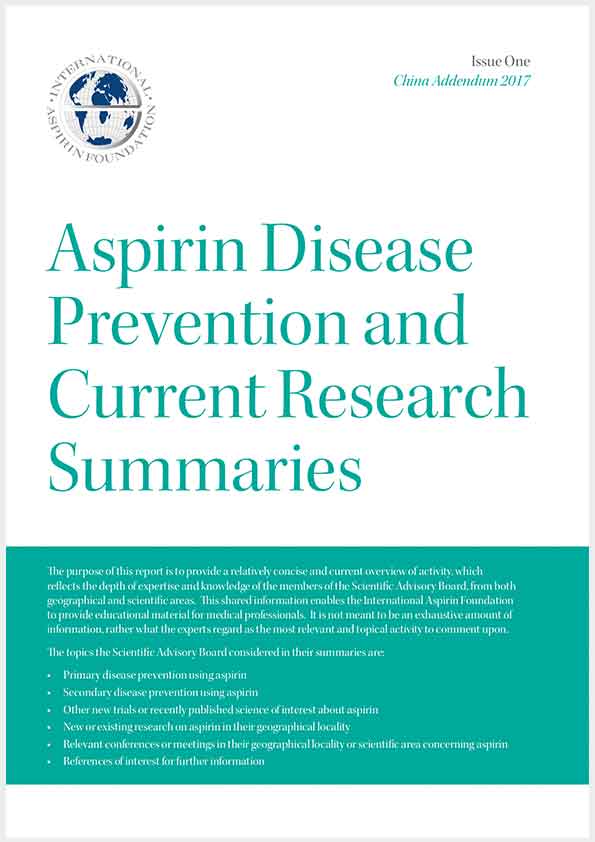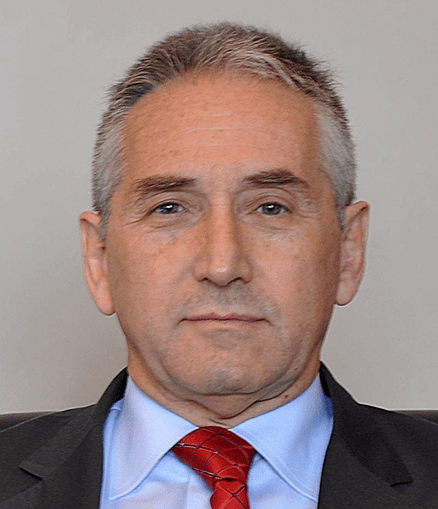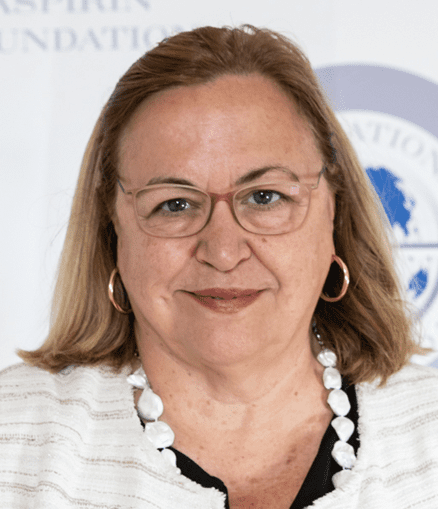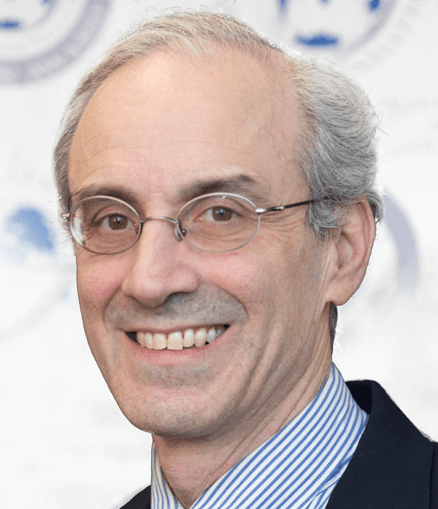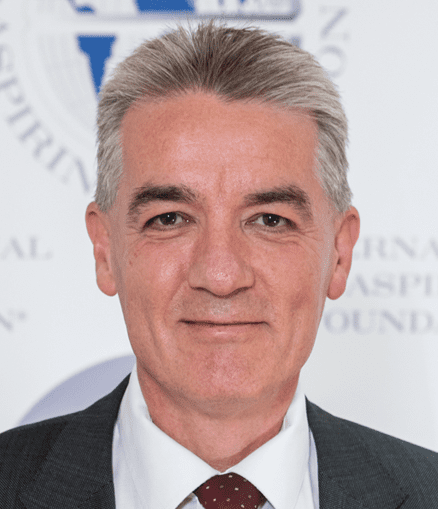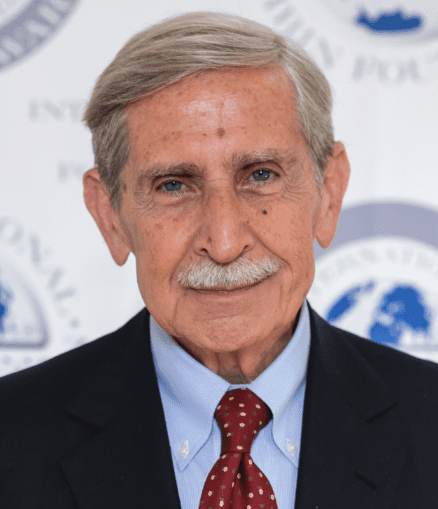Short-term effect of aspirin after TIA and minor stroke
The risk of major stroke is up to 10% in the days after a transient ischaemic attack (TIA) or minor stroke without appropriate treatment. Urgent medical treatment appears to reduce that risk by as much as 80%, but many patients delay seeking medical attention. In a recent population-based study in the UK, half of recurrent strokes in the days after a TIA occurred prior to medical attention being sought for the initial event.
Antithrombotic treatment is important in the immediate management of most acute ischaemic vascular events. Since aspirin is available in many households public education materials recommend self-administration by patients who develop acute chest pain, in addition to seeking immediate medical attention. There are, however, few published data from randomised trials on the effect of aspirin on risk of early recurrent stroke after TIA and minor stroke, and no data on severity. Randomised trials of aspirin vs. placebo in longer-term secondary prevention showed only a 13% relative reduction in risk of recurrent stroke. Trials of short term treatment of hospitalised acute stroke also reported a 13% reduction in the 4 week risk of recurrent stroke or intracerebral haemorrhage, but the effect of aspirin on risk or severity of recurrence after more minor stroke was not reported.
In the absence of published randomised evidence of the effect of aspirin on risk and severity of early recurrent stroke after TIA and minor stroke, researchers re-analysed individual patient data and reviewed original paper records on early outcomes from all available trials of aspirin vs. placebo in secondary prevention after TIA or ischaemic stroke1. To more reliably estimate the very early time-course of onset of effects of aspirin, they also studied risk of recurrent ischaemic stroke in trials of aspirin in treatment of acute stroke, stratified by severity of the pre-randomisation neurological deficit.
Among 15,778 patients in 12 trials of aspirin vs. control in secondary prevention, aspirin reduced the 6-week risk of major ischaemic vascular events by 70-80% (disabling or fatal ischaemic stroke – HR=0.29, 0.20-0.43, p<0.0001; acute myocardial infarction – HR=0.22, 0.09-0.53, p=0.0008), with greatest benefit in patients with TIA or minor stroke (disabling or fatal ischaemic stroke: 0-2 weeks-HR=0.07,0.02-0.31,p=0.0004; 0-6 weeks-HR=0.19,0.11-0.34,p<0.0001). The effect of aspirin on early recurrent ischaemic stroke was due partly to a substantial reduction in severity (mRS shift analysis: OR=0.43, 0.26-0.72, p=0.001). Some further reduction in risk of ischaemic stroke on aspirin vs control accrued from 6-12 weeks, but benefit after 12-weeks was limited(stroke risk-OR=0.97, 0.84-1.12, p=0.67; severity-mRS ‘shift’ OR=1.00, 0.77-1.29, p=0.97). In trials of aspirin versus control in major acute stroke (40,531 participants in 3 trials), the reduction in risk of recurrent ischaemic stroke was most evident in patients with less severe baseline deficits (interaction-p=0.014), and was substantial by the second day after starting treatment (2-3 days HR=0.37,0.25-0.57, p<0.0001).
The findings confirm that medical treatment substantially reduces the risk of early recurrent stroke after TIA and minor stroke and identify aspirin as the key intervention. The considerable early benefit from aspirin warrants public education about self-administration after possible TIA. The previously unrecognised effect of aspirin on severity of early recurrent stroke also has implications for understanding mechanisms of action.
References
- Rothwell PM, Algra A, Chen Z, Diener HC, Norrving B, Mehta Z. Effects of aspirin on risk and severity of early recurrent stroke after transient ischaemic attack and ischaemic stroke: time-course analysis of randomised trials. Lancet 2016; 18th May online.
Dr Andrew T Chan MD MPH, Boston, USA
Primary disease prevention using aspirin
In 2007, the U.S. Preventive Services Task Force (USPSTF) recommended against the use of aspirin for the prevention of colorectal cancer (CRC), but in April 2016, it published new guidelines which reversed this position. Supporting evidence had become compelling enough to include CRC prevention into their rationale for routine low-dose aspirin use among certain subgroups of adults with specific cardiovascular risk profiles.
This recommendation distinguishes aspirin as the first pharmacologic agent that the USPSTF has endorsed for chemo prevention of a cancer in a population not characterized as high risk. However, both the USPSTF and a UK panel have emphasized the need for additional research into the effect of long-term aspirin use on not only the incidence of CRC, but also of overall cancer, according to a range of doses and by subgroups, including age, sex, baseline cancer risk, or comorbid conditions. It is also unclear what the additional impact of aspirin use on cancer would be in the setting of screening, including lower endoscopy, which is associated with a significantly lower risk of CRC.
To address these critical questions, we examined the association of aspirin with incident cancer among 135,965 women and men enrolled in two large prospective U.S. cohort studies who provided detailed and updated information on aspirin use. In up to32 years of follow-up, we documented 20,414 cancers among women and 7,571 among men. Compared with non-regular use,regular aspirin use was associated with a lower risk of overall cancer (RR 0.97; 95% CI 0.94, 0.99), which was primarily due to a lower incidence of gastrointestinal cancers (RR 0.85; 95% CI 0.80, 0.91), especially colorectal cancers (RR 0.81; 95% CI 0.75, 0.88).The benefit of aspirin on gastrointestinal cancers appeared evident with use of at least 0.5 to 1.5 standard aspirin tablets per week; the minimum duration of regular use associated with lower risk was 6 years.
In people over 50 years old, regular aspirin use could prevent 33 colorectal cancers (PAR 17.0%) in those who have not had a lower endoscopy and 18 colorectal cancers per 100,000 person-years (PAR 8.5%) in those who have.
In conclusion, regular use of low doses of aspirin for at least 6 years was associated with significantly lower risk of overall cancer, primarily gastrointestinal tumours. Although aspirin may prevent colorectal cancers irrespective of screening, substantially more cases appear to be prevented among those who do not undergo screening.
These data are in press at JAMA Oncology
Recently published science of interest about aspirin: aspirin mechanism
In an Opinion article in press at Nature Reviews Cancer, we review the weight of the evidence supporting aspirin’s chemo preventive potential and highlight advances in our understanding of aspirin’s mechanisms of action. We challenge the notion that aspirin prevents cancer through a single, dominant pathway and propose an integrative multi-pathway model for its mode of action. We highlight how these pathways can be leveraged to develop mechanistic biomarkers for personalised risk stratification. Such biomarkers may then be translated clinically in a precision medicine approach critical to the future of aspirin chemo prevention.
Professor Ronald Eccles, Cardiff, UK
Science and trial data on aspirin for pain related symptoms in the common cold and flu
My area of interest is in studying the symptoms of acute upper respiratory tract infections such as common cold and flu, especially the mechanisms that cause the symptoms, and how they may be alleviated by treatments such as pain killers like aspirin. My interest in aspirin is as a treatment for pain-related symptoms of common cold and flu such as fever, sore throat pain, headache, muscle aches and pains and sore throat.
Pharmacology of aspirin as an analgesic for acute pain.
Aspirin works as a pain killer by inhibiting the enzymes that produce prostaglandins. This was discovered in the 1970’s and led to a Nobel Prize for Sir John Vane. Since then there have been great advances in understanding the pharmacology of aspirin and how it works in other diseases such as cardiovascular disease and cancer. Its efficacy as an analgesic has been shown in many clinical trials on acute pain such as headache and migraine, common cold and flu, muscle aches and pains, menstrual pain, toothache and pain after tooth extraction, and minor aches and pains of arthritis1.Randomised, placebo controlled clinical trials have been conducted in all these pain conditions and they now provide hard clinical evidence for the efficacy of aspirin as an analgesic.
To study the efficacy of analgesics we need a patient pain model that is relatively predictable and standardised. The pain of removal of impacted third molars is useful for clinical trials because it is a common dental procedure and its timing and intensity of the pain are predictable2.Studies on dental pain consistently demonstrate the efficacy of aspirin above placebo and show that aspirin is a more useful analgesic than paracetamol in the control of postoperative pain after third molar surgery2.
Aspirin is effective against both migraine and tension-type headache and is recommended as first-line treatment for each of these disorders in various managementguidelines3,4.
Pain associated with common cold such as sore throat pain is one of the commonest minor pains because of its high incidence throughout the world. Aspirin has been shown to be effective in treating sore throat pain, muscle aches and headache associated with common cold5,and in treating fever associated with upper respiratory tract infection6.
Speed of action is important for those who take aspirin as a pain killer.
Patients with acute pain demand an analgesic providing rapid relief of pain. Aspirin tablet studies have shown that their formulation has marked effects on its absorption and pharmacokinetics. Simple aspirin tablets have the slowest absorption into the blood stream and the speed of absorption can be greatly increased by giving aspirin as an effervescent formulation, and be further speeded up by buffering the aspirin7,8. The time to peak plasma concentration of aspirin in tablet form varies between 33-83 minutes, and recently its rate of absorption has been greatly accelerated by using micronized tablets with an effervescent nucleus, reducing absorption time to only 18 minutes4.
A future super aspirin?
In future the pain-killing action of aspirin may be increased by modifying its formula. Attaching nitric oxide and hydrogen sulphide donors to the aspirin molecule may enhance its analgesic efficacy9.This is an interesting development that opens up a new field of research on aspirin as an analgesic and anti-inflammatory medicine.
The development of nitric oxide (NO)- and hydrogen sulphide (H2S)-releasing non steroidal anti-inflammatory drugs (NSAIDs) has generated more potent medicines with increased safety profiles. The painkilling (antinociceptive)activity of a new hybrid molecule incorporating both NO and H2S donors into aspirin (NOSH-aspirin) has been compared with aspirin in different models of inflammatory pain. The results suggest that NOSH-aspirin represents a prototype of a new class of analgesic drugs with more potent effects than the traditional NSAID, aspirin.
References
- Gaciong Z. The real dimension of analgesic activity ofaspirin. Thromb Res. 2003;110(5-6):361-4.
- Seymour RA, Hawkesford JE, Sykes J, Stillings M, HillCM. An investigation into the comparative efficacy of soluble aspirin and solid paracetamol in postoperative pain after third molar surgery. Br Dent J.2003;194(3):153- 7; discussion 49.
- LamplC, Voelker M, Steiner TJ. Aspirin is first-line treatment for migraine and episodic tension-type headache regardless of headache intensity. Headache.2012;52(1):48-56.
- LecchiM, D’Alonzo L, Negro A, Martelletti P. Pharmacokinetics and safety of a new aspirin formulation for the acute treatment of primary headaches. Expert Opin Drug Metab Toxicol. 2014;10(10):1381-95.
- Eccles R, Loose I, Jawad M, Nyman L. Effects of acetylsalicylic acid on sore throat pain and other pain symptoms associated with acute upper respiratory tract infection. Pain Med. 2003;4(2):118-24.
- Bachert C, Chuchalin AG, Eisebitt R, Netayzhenko VZ,Voelker M. Aspirin compared with acetaminophen in the treatment of fever and other symptoms of upper respiratory tract infection in adults: a multi center, randomized, double-blind, double-dummy, placebo-controlled, parallel-group, single-dose, 6-hour dose-ranging study. Clin Ther. 2005;27(7):993-1003.
- LeonardsJR. The influence of solubility on the rate of gastrointestinal absorption of aspirin. Clin Pharmacol Ther. 1963;4:476-9.
- Davison C. Salicylate metabolism in man. Ann N Y AcadSci. 1971;179:249-68.
- Fonseca MD, Cunha FQ, Kashfi K, Cunha TM. NOSH-aspirin(NBS-1120), a dual nitric oxide and hydrogen sulfide-releasing hybrid, reduces inflammatory pain. Pharmacol Res Perspect. 2015;3(3):e00133.
Professor J Michael Gaziano MD, Boston, USA
The Risks and Benefits of Aspirin in the Primary Prevention of Cardiovascular Disease and Cancer
The benefits of aspirin in the secondary prevention of cardiovascular disease (CVD) have been conclusively demonstrated in hundreds of randomized trials those benefits clearly outweigh the risk for most patients. The risk-benefit analysis is more complicated for those who do not have known cardiovascular disease (CVD), and the data come from a smaller number of primary prevention trials. The USPreventive Services Task Force (USPSTF) recently released recommendations for the use of aspirin taking into account the potential value of aspirin in lowering the risk of CVD and colorectal cancer (CRC) and the potential risk of bleeding (1,2) updating recommendations from 2009 (3).
The summary recommendations suggest the use of aspirin for those age 50-59 with a10-year CVD risk of greater or equal to 10% as a Grade B recommendation and that the recommendation for those 60-69 years should be individualized with a Grade C recommendation. Specifically, persons aged 60-69 years who are not at increased risk for bleeding, have a 10-year life expectancy and are willing totake daily low dose aspirin for 10 years are more likely to have a net benefit. For those below 50 and 70 years and above, the data were insufficient for a firm recommendation.
These summary recommendations were based on a sophisticated decision analysis on the role of aspirin in primary prevention (4) and a series of additional supporting analyses carried out on behalf of the USPSTF (5-10).Previously, the USPSTF issued guidelines on the use of aspirin in the primary prevention of vascular events (3) were based only on cardiovascular benefit and bleeding risk. The 2016 recommendations consider not only the cardiovascular event reduction and risk of bleeding, but also considers newer data on the benefits of aspirin in the prevention of colorectal cancer that is apparent over a longer time frame than the CVD benefit.
The decision analysis relied on, among other sources, the recent systemic reviews done on behalf of USPSTF (5-9) exploring the specific risk and benefits of aspirin on CVD, cancer and specifically colorectal cancer (CRC), all-cause mortality, and bleeding risks. The authors used a CVD simulation model adding CRC incidence and fatality. The model was applied separately to men and women in various age strata. The authors considered lifetime risks as the primary time horizon but also consider 10 and20 year time window. They found a net benefit lifetime improvement in quality adjusted life years (QALYs) for most groups of men and women age 40 to 69years, but no such overall benefit for those 70 to 79. The benefit was also present for total life-years for most but not all groups of men and women 40 to69 years.
These analyses and the subsequent recommendations make it clear that there are subpopulations where there appears to be an overall net benefit of low dose aspirin for thep rimary prevention of CVD events and CRC. These recommendations are among the first to carefully consider long-term impact of low dose aspirin on cancer risk, in particular colorectal cancer risk. Since this risk-benefit assessment is complex, it makes sense to consult a physician when considering the use of aspirin in primary prevention for a specific person.
References
- Final Recommendation Statement: Aspirin Use to Prevent Cardiovascular Disease and Colorectal Cancer: Preventive Medication. U.S. Preventive Services Task Force. April 2016.
- Bibbins-Domingo K; U.S. Preventive Services Task Force. Aspirin use for the primary prevention of cardiovascular disease and colorectal cancer: U.S. Preventive Services Task Force recommendation statement. Ann Intern Med. 2016;164:836-45. doi:10.7326 /M16-0577
- U.S. Preventive Services Task Force. Aspirin for the prevention of cardiovascular disease: recommendation statement.Ann Intern Med 2009;150:396-404.
- Dehmer SP, Maciosek MV, Flottemesch TJ, LaFrance AB, Whitlock EP. Aspirin for the Primary Prevention of Cardiovascular Disease and Colorectal Cancer: A Decision Analysis for the U.S. Preventive Services Task Force. Ann Intern Med. 2016 Jun 21;164(12):777-86.
- EA, Whitlock EP. Aspirin for the Primary Prevention of Cardiovascular Events: A Systematic Evidence Review for the U.S. Preventive Services Task Force. Evidence Synthesis No. 131. AHRQ Publication No.13-05195-EF-1. Rockville, MD: Agency for Healthcare Research and Quality; 2015. [PMID: 26491760]
- Chubak J, Kamineni A, Buist DSM, Anderson ML, Whitlock EP. Aspirin Use for the Prevention of Colorectal Cancer: An Updated Systematic Evidence Review for the U.S. Preventive Services Task Force. Evidence Synthesis No. 133. AHRQ Publication No. 15-05228-EF-1. Rockville, MD: Agency for Healthcare Research and Quality; 2015. [PMID: 26491758]
- Whitlock EP, Williams SB, Burda BU, Feightner A, Beil T. Aspirin Use in Adults: Cancer, All-Cause Mortality and Harms. A Systematic Evidence Review for the U.S. Preventive Services Task Force. Evidence Synthesis No. 132. AHRQ Publication No. 13-05193-EF-1.Rockville, MD: Agency for Healthcare Research and Quality; 2015.[PMID: 26491756]
- Guirguis-Blake JM, Evans CV, Senger CA, O’Connor EA, Whitlock EP. Aspirin for the primary prevention of cardiovascular events: a systematic evidence review for the U.S. Preventive Services Task Force. Ann Intern Med. 2016;164:804-13. doi:10.7326/M15-2113
- Chubak J, Whitlock EP, Williams SB, Kamineni A, Burda BU, Buist DSM, et al. Aspirin for the prevention of cancer incidence and mortality: systematic evidence reviews for the U.S. Preventive Services Task Force. Ann Intern Med. 2016;164:814-25. doi:10.7326 /M15-2117
- Whitlock EP, Burda BU, Williams SB, Guirguis-Blake JM, Evans CV. Bleeding risks with aspirin use for primary prevention in adults: a systematic review for the U.S. Preventive Services Task Force. Ann Intern Med. 2016;164:826-35. doi:10.7326/M15-2112
Dr Ruth Langley PhD FRCP, London, UK
Secondary disease prevention using aspirin in the treatment of cancer
Background: Pre-clinical, epidemiological and randomised data suggest that aspirin could prevent or delay the spread and development of cancer, particularly secondary cancers (metastases) (1).
The observation that taking aspirin after a cancer diagnosis is associated with improved cancer-specific and overall survival has led to clinical trials evaluating aspirin as a treatment for cancer (particularly as an adjuvant to other treatments) and to the search for biomarkers predicting response. A major part of the evidence base relating to aspirin and cancer has come from randomized trials designed to evaluate the vascular effects of aspirin (2-5).
Rothwell et al. analyzed data from 51randomised trials, with ~77,000 participants. There were 19% fewer cancers (hazard ratio 0.81 [95% CI 0.7-0.93]) among those that took aspirin for 5 years or more. There was also a 15% reduction in cancer deaths in tumours arising from different sites including the gastrointestinal tract, breast, prostate and lung.
The most relevant observation for treatment of cancer was that within a few years of starting aspirin there were beneficial effects on cancer outcomes. The cancers that did develop when these trial subjects were taking aspirin were subsequently found to be less likely to have spread (or have formed metastasis) at diagnosis and were less likely to do so later.
Possible mechanisms of action for aspirin’s effect on cancer :
A once daily dose of 75 to 300mg aspirin has a half-life of ~ 20 minutes and the primary target is thought to be Cox-1 activity in platelets. Platelets have been implicated in the spread and the development of metastases. Platelets may also be involved in the development of primary tumours through growth factors and other paracrine signaling pathways. There is an inconsistent reported relationship between tumour Cox-2 expression and aspirin benefit. Other target biomarkers include PIK3CA expression in tumours, which has been studied in four different studies (Table 1) (6), and Human Leukocyte Antigen (HLA)expression on tumour cells (Table 2) (7).
Table 1 Studies examining PIK3CA mutation, aspirin use and colorectalcancer outcomes.
| Study | % PIK3CA Mutant | Endpoint | PIK3CA Mutant | PIK3CA Wild-Type | ||||
| No aspirin | Aspirin | HR (p value) | No aspirin | Aspirin | HR (p value) | |||
| Nurses’ Health Study ft Health Professionals Follow-up Study (Liao 2012) | 16.7% | OS | 95 | 66 | 0.54 (0.01) | 466 | 337 | 0.94 (0.96) |
| CSS | – | – | 0.18 (<0.001) | – | – | 0.96 (0.76) | ||
| VICTOR trial (Domingo 2013) | 11.6% | OS | 90 | 14 | 0.29 (0.19) | 681 | 111 | 0.95 (0.26) |
| RFS | – | – | 0.11 (0.027) | – | – | 0.94 (0.79) | ||
| Moffitt Cancer Centre & Royal Melbourne Hospital (Kothari 201S) | 12.4% | OS | 136 | 49 | 0.96 (0.86) | – | – | – |
| CSS | – | – | 0.60 (0.14) | – | – | – | ||
| Eindhoven Cancer Registry (Reimen 2014) | 15.8% | OS | 73 | 27 | 0.73* (0.4) | 348 | 147 | 0.55 (<0.001) |
* =Adjusted rate ratio, OS=overall survival, CSS=colorectal cancerspecific survival, RFS=recurrence free survival, HR=multivariate hazard ratio
Platelets are thought to protect disseminating tumour cells from attack by natural killer cells, which recognize and eliminate cells with low/absent expression of HLA class I antigen. It was proposed that the survival benefit associated with low-dose aspirin use after a cancer diagnosis would be associated with tumours that have low or absent HLA class I antigen expression. However, this study appeared to show the reverse (7).Human Leukocyte Antigen (HLA) data :
Table2 HLA data
| Characteristic | No. of Patients | No. of Deaths | Univariate RR (95% CI) | P Value” | Adjusted RR (95% Ci)c | P Value” |
| HLA class I antigen | ||||||
| Loss | ||||||
| No aspirin use | 263 | 123 | 1 (Reference) | .74 | 1 (Reference) | .91 |
| Aspirin use | 57 | 26 | 1.08 (0.70-1.64) | 1.03 (0.66-1.61) | ||
| Expression | ||||||
| No aspirin use | 521 | 257 | 1 (Reference) | .003 | 1 (Reference) | <.001 |
| Aspirin use | 122 | 42 | 0.61 (0.44-0.85) | 0.53 (0.38-0.74) |
An alternative hypothesis is that HLA expression is needed for NFkb-mediated platelet signalling which promotes epithelial-mesenchyme transition and enhanced metastatic potential which aspirin inhibits.
Summary
- There is increasing evidence that aspirin hasanti-cancer effects (possibly mediated through platelets).
- A series of large randomised trials are ongoing or planned. They aim to define whether there is a role for aspirin in the treatment of several common tumours.
- These studies will quantify benefits both from an oncology and cardiovascular perspective and any associated risks, in particular the increased risk of bleeding.
- The studies will be long-term projects as the effects on the primary prevention of cancer may take 10-20 years to become apparent.
- Correlative science projects associated with the trials offer the opportunity to understand the anti-cancer mechanisms of aspirin.
- Given the increasing cancer burden in low-resource countries and that aspirin is a low cost generic, potentially these studies could have a large impact on global cancer outcomes if aspirin is shown to be beneficial in the treatment of cancer.
References
- Langley RE, Burdett S, Tierney JF, Cafferty F,Parmar MK, Venning G. Aspirin and cancer: has aspirin been overlooked as anadjuvant therapy? Br J Cancer. 2011; 105(8): 1107-13.
- Rothwell PM, Wilson M, Elwin CE, Norrving B, Algra A,Warlow CP, et al. Long-term effect of aspirin on colorectal cancer incidence and mortality: 20-year follow-up of five randomised trials. Lancet. 2010;376(9754): 1741-50.
- Rothwell PM, Fowkes FG, Belch JF, Ogawa H,Warlow CP, Meade TW. Effect of daily aspirin on long-term risk of death due to cancer: analysis of individual patient data from randomised trials. Lancet.2011; 377(9759): 31-41.
- RothwellPM, Price JF, Fowkes FG, Zanchetti A, Roncaglioni MC, Tognoni G, et al. Short-term effects of daily aspirin on cancer incidence, mortality, and non-vascular death: analysis of the time course of risks and benefits in 51randomised controlled trials. Lancet. 2012; 379(9826): 1602-12.
- Rothwell PM, Wilson M, Price JF, Belch JF, MeadeTW, Mehta Z. Effect of daily aspirin on risk of cancer metastasis: a study of incident cancers during randomised controlled trials. Lancet. 2012.
- Coyle C, Cafferty FH and Langley RE. Aspirin and Colorectal Cancer Prevention – Is it for everyone? Curr Colorectal Cancer Rep(2016) 12:27–34
- Reimers MS, Bastiaannet E, Langley RE, van Eijk R, vanVlierberghe RL, Lemmens VE, et al. Expression of HLA Class-I Antigen, Aspirin Use, and Survival After a Diagnosis of Colon Cancer. JAMA Intern Med, 2014174(5) 732-739.
Professor Carlo Patrono MD, Rome, Italy
Primary cardiovascular disease (CVD) and colorectal cancer (CRC) prevention using aspirin
The US and European guidelines on recommending aspirin for primary prevention have been conflicting, which reflects their uncertainty about the balance of cardiovascular (CV) benefits and bleeding risk1 The April 2016recommendation of the United States Preventive Services Task Force (USPSTF),which includes prevention of colorectal cancer (CRC) among the long-term benefits of aspirin prophylaxis, is likely to have an impact on the next round of treatment guidelines from other organisations.
Secondary prevention using aspirin
Despite the development and approval of novelantiplatelet agents (e.g., prasugrel, ticagrelor, vorapaxar) during the past 10years, low-dose aspirin remains the cornerstone of first-line antithrombotic treatment of acute ischemic syndromes (e.g., acute coronary syndromes [ACS]2),as well as secondary prevention of their atherothrombotic complications3.
The demonstration of additive beneficial effectsresulting from effective blockade of the platelet ADP and/or thrombin receptoron top of TXA2 suppression in high-risk patients is consistent with the multifactorial nature of atherothrombosis and the non-redundant nature of these different pathways of platelet activation 4. However, several randomized trials are underway to determine whether aspirin can be dropped from combined antiplatelet regimens for the long-term management of patients who are treated with one of the new antiplatelet drugs 5.
Similarly, there are a series of ongoing randomized trials, in which aspirin is being dropped from combined antiplatelet/ anticoagulant therapy inpatients with atrial fibrillation and ACS or undergoing PCI (see www.clinicaltrials.gov). This trend is likely to weaken the place of aspirin in secondary prevention.
New trials and recently published science of interest on aspirin
A recently published CHEST Guideline6 addresses the use of low-dose aspirin for the prevention of recurrent venous thromboembolism(VTE): “In patients with an unprovoked proximal DVT or PE who are stopping anticoagulant therapy and do not have a contraindication to aspirin, we suggest aspirin over no aspirin to prevent recurrent VTE (Grade 2C)”.
New research on aspirin in Italy
Current clinical trials of aspirin in Italy include ACCEPT-D (Aspirin and Simvastatin Combination for Cardiovascular Events Prevention Trial in Diabetes), a primary prevention trial coordinated by Dr. Nicolucci at the Mario Negri Institute in Milan, and ASAMET, a randomized, 2×2 biomarker prevention trial of low-dose aspirin and metformin in colon cancer patients coordinated by Dr. De Censi at the E.O. Ospedali Galliera in Genova. Moreover, investigators in Rome, Chieti, Verona, Siena and Bari, coordinated by Prof. Paola Patrignani, are collaborating in investigating the role of platelet activation in intestinal tumorigenesis. They will test the hypothesis that inhibition of platelet activation may explain the efficacy of low-dose aspirin as a chemopreventive agent.
References
- Patrono C. Low-dose aspirin in primary prevention: cardio protection, chemoprevention, both or neither? Eur Heart J2013;34:3403–11.
- 2. Roffi M, Patrono C, Collet JP, et al. 2015 ESC Guidelines for the management of acute coronary syndromes in patients presenting without persistent ST-segment elevation: Task Force for the Management of Acute Coronary Syndromes in Patients Presenting without Persistent ST-Segment Elevation of the European Society of Cardiology (ESC). Eur Heart J2016;37:267-315.
- 3. Parekh AK, Galloway JM, Hong Y, et al. Aspirin in the secondary prevention of cardiovascular disease. N Engl J Med2013;368:204–5.
- 4. Davì G, Patrono C. Platelet activation and atherothrombosis. N Engl J Med 2007;357: 2482–94
- 5. GLOBAL LEADERS: Vranckx P, Valgimigli M, Windecker S et al. Long-term ticagrelor monotherapy versus standard dual anti platelet therapy followed by aspirin monotherapy in patients undergoing biolimus-eluting stent implantation: rationale and design of the GLOBAL LEADERS trial. Euro Intervention. 2015; 11(7). pii: 20150318-06. doi: 10.4244/EIJY15M11_07.[Epub ahead of print].
- 6. Kearon C, Akl EA, Ornelas J et al, Antithrombotic Therapy for VTE Disease: CHEST Guideline, CHEST 2016, doi: 10.1016/j.chest.2015.11.026.
Besides the references quoted in the text, the following may be of interest:
Patrono C (2015) The multifaceted clinical readouts of platelet inhibition by low-dose aspirin. J Am Coll Cardiol 66:74-85.
Scavone M, Femia EA, Caroppo V, Cattaneo M. Inhibition of the platelet P2Y12 receptor for adenosine diphosphate does notimpair the capacity of platelet to synthesize thromboxane A2.Eur Heart J. 2015 Oct 29. pii: ehv551. [Epub ahead of print]
Chan AT, Ladabaum U. Where do we stand with aspirin for the prevention of colorectal cancer? The USPTF recommendations.Gastroenterology. 2015 Nov 18. pii: S0016-5085(15)01665-0. doi: 10.1053 / j.gastro.2015.11.018. [Epub ahead of print]
Disclaimers
- The information, views and opinions expressed on the International Aspirin Foundation website are not endorsed or approved by members of The Scientific Advisory Board unless otherwise stated.
- The Information section on the website is compiled using current published information at the time of writing and whilst every effort has been made to avoid errors, professional clinical judgement is required to interpret the information given. The information given is referenced clearly for further analysis as required.
- Every effort is made by The International Aspirin Foundation to see that no misleading or inaccurate data, statement or opinion appear on the website, The International Aspirin Foundation cannot be held responsible for any errors or for any consequences arising from the use of the information contained on the website.
- The International Aspirin Foundation, its associates and The Scientific Advisory Board accept no liability whatsoever for the consequences of any such inaccurate or misleading data, information, opinion or statement.
- Any information involving drug usage, should only be followed in conjunction with the drug manufacturer’s own published literature in their own country.
- Medical sciences evolve on a continual basis and therefore independent verification of the website content should be made.
- The information, views, opinions and any other material provided on this website should not be relied upon as a substitute to professional medical advice in relation to any medical condition. The International Aspirin Foundation, its associates and The Scientific Advisory Board accept no liability whatsoever for any consequences arising from any reliance placed on such information, views, opinions and other materials in lieu of professional medical advice.

